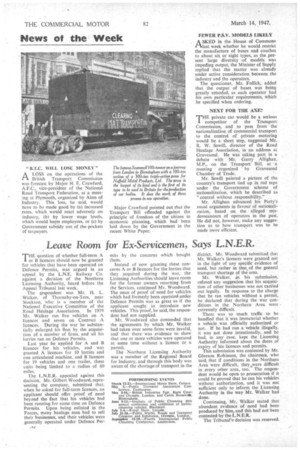News of the Week
Page 28

If you've noticed an error in this article please click here to report it so we can fix it.
" B.T.C. WILL LOSE MONEY"
ALOSS on the operations of the British Transport Commission was forecast by Major H. E. Crawford, A.F.C., vice-president of the National Road Transport Federation, at a meeting at Plymouth, organized by Aims of Industry. This loss, he said, would have to be made good by (a) increased rates, which would react adversely on industry, (b) by lower wage levels. which would harm employees, or (c) by Government subsidy out of the pockets of taxpayers. The famous Sccrrnmel1100-tonner on a journey from London to Birmingham with a 100-ton section of a 300-ton triple-action press for Nuffield Metal Products, Ltd. The press is the largest of its kind and is the first of its type to be used in Britain for the production of car bodies. It does the work of three
presses in one operation.
Major Crawfurd pointed out that the Transport Bill offended against the principle of freedom of the citizen in economic planning, which had been laid down by the Government in the recent White Paper. FEWER P.S.V. MODELS LIKELY
ASKED in the House of Commons .last week whether he would restrict the manufacture of buses and coaches to about six or eight types, as the present large diversity ,of models was impeding output, the Minister of Supply replied that the matter was already under active consideration between the industry and the operators.
The questioner, Mr. Follick, added that the output of buses was being greatly retarded, as each operator had his own particular requirements, which he specified when ordering.
NEXT FOR THE AXE?
THE private car would be a serious competitor of the Transport Commission, and to pass from the nationalization of commercial transport to the control of private motoring would be a short step, suggested Mr. R. W. Sewill, director of the Road Haulage Association, in an address at Gravesend. He was taking part in a debate with Mr. Garry Allighan, M.P., on the Transport Bill, at a meeting organized by Gravesend Chamber of Trade.
Mr. Sewill painted a picture of the country's transport tied up in red tape under the Government scheme of nationalization, which he described as "control without responsibility." , Mr. Allighan advanced his Party's usual arguments in favour of nationalization, based on the alleged misdemeanours of operators in the pig. He did not, however, make any suggestion as to how transport was to be made more efficient.




















































































